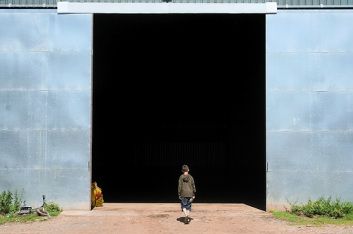
Now when I say nothing matters, I’m saying that nothing by which I defined myself in the past needs to limit me today. I am free to explore and create a new narrative unhindered by self-limiting stories.
In The World is Made of Stories, Buddhist David R. Loy talks about a constricting and self-limiting understanding of the self based on the stories we tell about ourselves, over and over. These are the stories we have been telling ourselves and others about who we are and what our world is like. They are the way we understand our own lives. We live in these stories as fish live in water.
Beyond stories that limit our identity is another part of ourselves, a still-unstoried self that “preserves the possibility of novelty, of doing and becoming something different,” Loy says. He calls this un-narrated part of us “No-thing-ness.” Nothingness. Nothing solid. This is the no-thing-ness that matters to me now.
Given this new concept of the nothing that matters, I can skip quickly through the past that no longer need define me. In the late ‘50s, the “nothing” that mattered to a sophomore in a private, Presbyterian liberal arts college where chapel was compulsory was “no school rules matter. But, as I break them, please notice.” I am no longer that morose, skinny, brunette in a black leotard, eager to define herself by her lack of beliefs. Nor am I the young mother of two little boys in her twenties asking god to turn her into a believing Jew, nor the middle-aged woman hoping for a lift through total baptismal immersion and calling herself a Christian. Iteration after iteration brings me to now, a Unitarian Universalist without dogma, as well as a budding meditator for whom the “no-thing-ness” promises a chance to broaden my narrative.
Rumi’s poem “The Worm’s Waking” encourages me to “wake up” and slow down the story telling so as to make room for this broader narrative.
THE WORM'S WAKING
This is how a human being can change:
there’s a worm addicted to eating
grape leaves.
Suddenly he wakes up,
call it grace, whatever, something
wakes him, and he’s no longer
a worm.
He’s the entire vineyard,
and the orchard too, the fruit, the trunks,
a growing wisdom and joy
that doesn’t need
to devour.
Through meditation and learning from Buddhist teachings, I am making space to be cast in new narratives, especially those that allow space for living loving-kindness. Through loving-kindness, I realize how much I have in common with others. Like me, every sentient being wants fulfillment and to escape suffering.
Living loving-kindness means practicing empathy, being willing to see the world from another point of view. It’s wishing others well. It is friendliness, consideration, kindness, and generosity. It is the basis for compassion, for shared joy. It’s my inherent potential. To wish another well is to wish that they be in a state of experiencing loving-kindness. Moreover, it is an attitude rather than just a feeling.
Freeing myself from the fixed and limited “I,” in my habitual stories, I am beginning to give myself space to be a kinder, more loving person. With that intention perhaps I can answer a question David R. Loy poses: “What stories do I want to live? The non-dual way to say this is “What stories want to come to life through me?”
 RSS Feed
RSS Feed